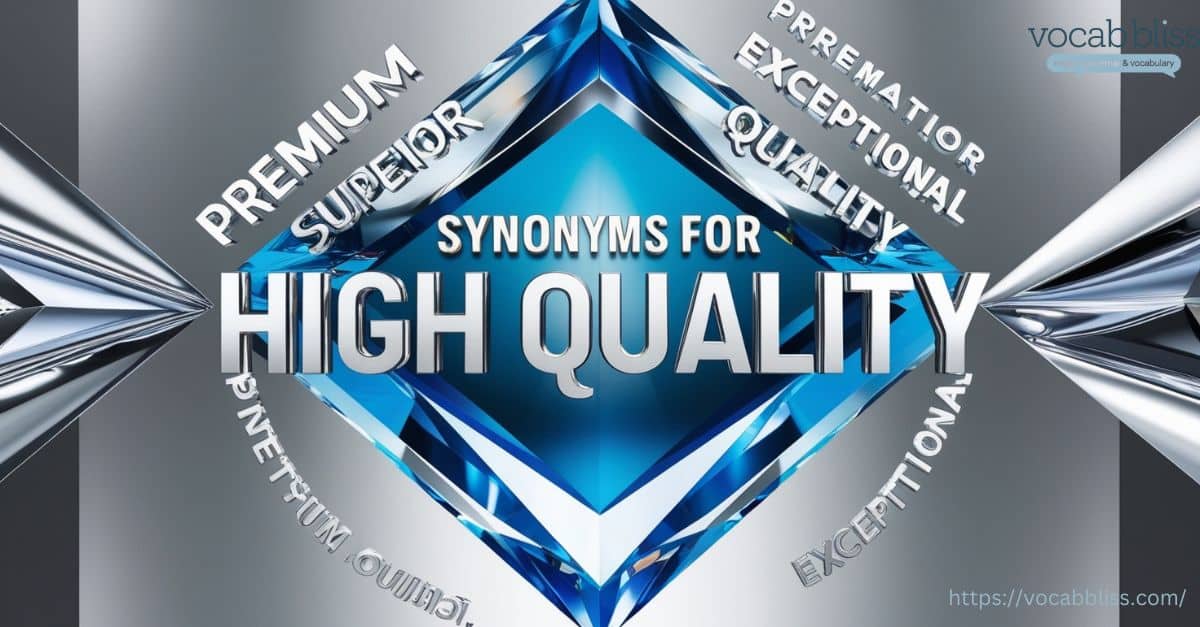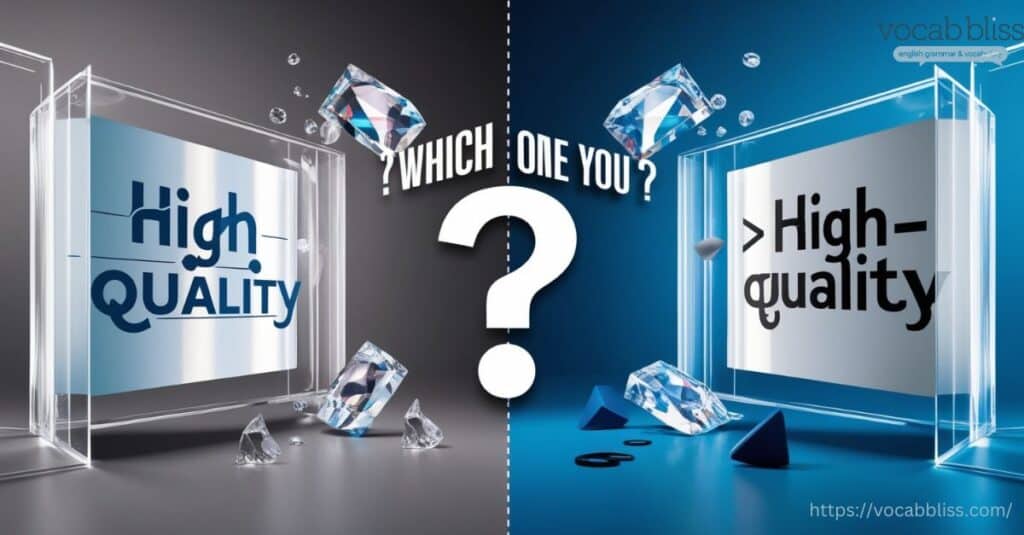When it comes to crafting clear and professional writing, precision is key. One common point of confusion arises when deciding between “high quality or high-quality.” Are they interchangeable? Does it matter if one is hyphenated?
In this article, we’ll break down the grammar, explore the contexts for each term, and clarify the rules of usage. By the end, you’ll confidently know when to use “high quality or high-quality” in your writing.
Quick Summary
When it comes to the terms “high quality” and “high-quality,” understanding their grammatical differences is essential for clear and correct writing. “High quality” is a noun phrase used to describe a level or standard of excellence, typically appearing after a verb or preposition. On the other hand, “high-quality” is a compound adjective, used to modify a noun directly and usually placed before the noun it describes. Both terms convey the same meaning of superior quality, but their roles in a sentence determine when and how to use each correctly.
Discover more: Busses or Buses: Clarifying the Plural Form of “Bus”
Why is There Confusion Between “High Quality or High-Quality”?

At first glance, “high quality or high-quality” seem almost identical. After all, both refer to excellence or superiority. However, the difference in grammatical function and the presence (or absence) of a hyphen can significantly change how they’re used. This subtle distinction often leads to confusion, even among seasoned writers.
Overlap in Meaning
Both phrases point to something that meets a high standard. Whether describing a product, service, or concept, they convey the idea of exceptional value or superior attributes. However, their grammatical roles differ:
- “High quality” acts as a noun phrase, typically following a verb.
- “High-quality” functions as an adjective, modifying a noun directly.
For example:
- “The results were of high quality.” (noun phrase)
- “She purchased a high-quality laptop.” (adjective)
Tricky Hyphenation Rules
Hyphenation in English exists to make writing clearer, but it’s not always straightforward. The hyphen’s role is to connect words that work together as a single descriptor before a noun. Omitting or misplacing a hyphen can result in ambiguity or change the meaning entirely.
Consider this example:
- Without a hyphen: “We deliver high quality products.” (The reader might interpret this as high products that are quality.)
- With a hyphen: “We deliver high-quality products.” (Now, it’s clear that the quality of the products is high.)
Context Dependence
Whether or not to use a hyphen depends on where the phrase appears in the sentence:
- Before the noun: Use the hyphen to create a compound adjective.
- Example: “The event featured high-quality entertainment.”
- After the verb: Do not use a hyphen; treat “high quality” as a noun phrase.
- Example: “The entertainment was of high quality.”
This reliance on context makes the rules appear inconsistent, adding to the confusion.
Common Mistakes
Writers often make errors due to a lack of understanding of these distinctions:
- Incorrect Usage: “The presentation was high-quality.”
- Here, “high-quality” is incorrectly used as a predicate adjective without a noun to modify.
- Overuse of Hyphenation: “This is a high quality of work.”
- The hyphen isn’t needed because “high-quality” doesn’t modify the noun “work” correctly in this construction.
Why These Errors Occur
- Misinterpreting Grammatical Function: Many people assume the terms are interchangeable without considering their grammatical role.
- Uncertainty About Hyphenation Rules: Hyphenation can feel arbitrary, especially for non-native speakers or those unfamiliar with style guides like the Chicago Manual of Style or AP Stylebook.
- Rushed Writing: In informal contexts, writers may not take the time to evaluate whether the hyphen is needed, leading to errors.
By understanding these differences, you can avoid common pitfalls and use each term with confidence, enhancing your writing and clarity.
Defining “High-Quality or High Quality”

The distinction between “high-Quality or high Quality” lies in their grammatical roles and usage. While they share a common core meaning of excellence or superiority, their function in sentences determines when and how they should be used.
What Does “High Quality” Mean?
“High quality” is a noun phrase that describes a level, standard, or degree of excellence. It doesn’t directly modify another noun but instead serves as the subject, object, or complement in a sentence.
Definition
“High quality” refers to an exceptional level of performance, craftsmanship, or value. It emphasizes the inherent excellence of the item, service, or concept it describes.
Grammatical Role in Sentences
In sentences, “high quality” often follows verbs or prepositions, acting as a complement or object:
- As a complement: “This product is of high quality.”
- As an object: “They delivered high quality with their work.”
It doesn’t act as a direct modifier but instead elaborates on the subject or object of the sentence.
Examples of “High Quality” in Use
- “The chef insists on using ingredients of high quality.”
- “Their commitment to producing high quality has earned them awards.”
- “You can expect nothing but high quality from this brand.”
What Does “High-Quality” Mean?
“High-quality” is a compound adjective that directly modifies a noun. By combining “high” and “quality” with a hyphen, the phrase becomes a unified descriptor, highlighting the exceptional attributes of the noun it precedes.
Definition
“High-quality” describes the superior characteristics or features of a noun. It emphasizes that the item, service, or concept being discussed meets or exceeds a certain standard of excellence.
How It Describes Characteristics of a Noun
As an adjective, “high-quality” always precedes the noun it modifies:
- “This is a high-quality product.”
- “We specialize in high-quality manufacturing techniques.”
It helps readers or listeners immediately understand the superior nature of the noun, offering clarity and precision.
Examples of “High-Quality” in Use
- “Customers rave about the high-quality sound of these headphones.”
- “The team focused on delivering a high-quality experience for users.”
- “He purchased a high-quality lens for his photography projects.”
High Quality vs High-Quality: Key Differences
Although “high-Quality or high Quality” share the same underlying meaning, their usage depends on grammatical roles and sentence structure. Let’s dive deeper to understand when to use each term and why it matters.
When to Use “High Quality”
“High quality” functions as a standalone noun phrase. It describes the degree or standard of excellence of something without directly modifying another noun.
How “High Quality” Works in Sentences
“High quality” typically appears after verbs or prepositions. It serves as a complement to the subject or an object in the sentence, emphasizing the value or standard being discussed.
Sentence Structures:
- “This is of high quality.”
- “Their work consistently demonstrates high quality.”
Common Usage Contexts
- Product or Service Reviews: “The craftsmanship in this piece is of high quality.”
- Discussions About Standards: “They focus on delivering high quality across all departments.”
- Comparisons: “This brand is known for its emphasis on high quality.”
This usage is ideal when highlighting excellence without linking it directly to a specific noun.
When to Use “High-Quality”
“High-quality” is a compound adjective used to directly modify a noun. It describes the superior characteristics or attributes of the noun it precedes.
How “High-Quality” Works in Sentences
“High-quality” must always come before the noun it modifies, forming a clear and concise descriptor.
Sentence Structures:
- “They developed a high-quality application for their users.”
- “Investing in high-quality materials ensures durability.”
Specific Contexts Where It’s Preferred
- Marketing and Branding: “Our store offers high-quality products at competitive prices.”
- Formal Writing: “The initiative focused on providing high-quality education to underserved communities.”
- Professional Descriptions: “She delivered a high-quality presentation during the meeting.”
This form is particularly effective in business communication, advertising, and academic writing, where succinct modifiers are crucial.
The Key Differences Simplified
To make the distinction crystal clear, here’s a side-by-side comparison of high Quality or high-Quality
| Aspect | High Quality | High-Quality |
|---|---|---|
| Grammatical Role | Noun phrase | Adjective |
| Position in Sentence | After the verb | Before the noun |
| Purpose | Describes a standard or degree of excellence | Modifies and describes a noun |
| Example | “This is of high quality.” | “This is a high-quality product.” |
Synonyms for “High Quality or High-Quality”

Using synonyms can enrich your writing, avoid repetition, and convey nuanced meanings. While “high-Quality or high Quality” are widely understood, there are alternative terms you can use depending on the context. Below, we explore synonyms for both the noun phrase “high quality” and the adjective “high-quality,” along with examples and when to use them.
Synonyms for “High Quality” (Noun Phrase)
“High quality” as a noun phrase emphasizes a standard of excellence. Synonyms for this phrase often describe the same idea with slight variations in tone or specificity.
Examples of Synonyms
- Excellence: Refers to outstanding quality or superiority.
- Example: “The team strives for excellence in every project.”
- Superior Standard: Highlights a high benchmark or level.
- Example: “This restaurant maintains a superior standard in both service and cuisine.”
- Premium Grade: Suggests a high tier or ranking, often used in industries like manufacturing or retail.
- Example: “Our coffee beans are selected for their premium grade.”
- Exceptional Quality: Emphasizes a remarkable or outstanding degree of quality.
- Example: “They are known for delivering products of exceptional quality.”
- Top Tier: Indicates the highest level within a category.
- Example: “The company operates at a top-tier level in its field.”
Contextual Usage
- Formal Writing: Use “excellence” or “superior standard” for professional and academic contexts.
- Marketing: Terms like “premium grade” and “top tier” work well in advertising and product descriptions.
- Everyday Use: “Exceptional quality” is versatile and fits casual or formal writing.
Synonyms for “High-Quality” (Adjective)
“High-quality” as an adjective directly modifies nouns. Synonyms for this form focus on describing the exceptional characteristics of an item or concept.
Examples of Synonyms
- Superior: Indicates that something is better than its counterparts.
- Example: “These are superior materials for construction.”
- Top-Notch: A more casual term for excellent or first-class quality.
- Example: “He provided a top-notch solution to the problem.”
- Premium: Suggests luxury or exclusivity, often associated with high value.
- Example: “This brand offers premium packaging for its products.”
- First-Rate: Implies the highest standard or quality.
- Example: “Her work was first-rate, earning her multiple awards.”
- World-Class: Highlights global recognition for outstanding quality.
- Example: “The resort offers world-class amenities for its guests.”
When and Why to Use These Alternatives
- Professional Contexts: Words like “superior” or “premium” lend a formal tone to reports or business documents.
- Casual Writing: Terms like “top-notch” and “first-rate” work better in informal writing or speech.
- Branding and Marketing: “World-class” and “premium” appeal to audiences seeking prestige or exclusivity.
Choosing the Right Synonym
The choice of synonym depends on the tone, audience, and context. Here’s a quick guide:
| Tone | Best Synonym Choices | Example |
|---|---|---|
| Formal | Excellence, superior standard | “Their designs showcase a superior standard.” |
| Casual | Top-notch, first-rate | “The restaurant serves top-notch meals.” |
| Marketing | Premium, world-class | “Experience our world-class skincare collection.” |
Examples of “High Quality” and “High-Quality” in Context
“High Quality” (Noun Phrase)
- “The craftsmanship is undeniably of high quality.”
- “Customers value high quality in both products and services.”
“High-Quality” (Adjective)
- “A high-quality finish can make all the difference.”
- “Investing in a high-quality team pays off in the long run.”
The Origins of “High Quality or High-Quality”
Understanding the origins of “high quality” and “high-quality” provides insight into their development and their nuanced roles in the English language. Both terms reflect the evolution of English grammar and the broader cultural emphasis on excellence.
Origins of “High Quality”
The phrase “high quality” combines two terms with distinct yet complementary origins:
- “High”: Derived from the Old English hēah, meaning lofty or elevated, the word “high” has long been associated with superior position, value, or importance. Historically, it was used metaphorically to signify something better or above average.
- “Quality”: Stemming from the Latin qualitas, meaning “nature” or “state of being,” the term entered English via Old French. Over time, it evolved to signify the inherent characteristics of something, particularly its degree of excellence.
Historical Contexts of Use
The combination of “high” and “quality” likely gained traction during the late Middle Ages and Renaissance, as societies began valuing craftsmanship and setting standards for goods and services. Early uses in literature often referenced superior moral or artistic standards:
- Shakespearean Works: Phrases akin to “high quality” appear in Elizabethan literature, emphasizing excellence in character or creation.
- Industrial Revolution: With the rise of manufacturing, the term became more common in discussions about product standards, marking a shift toward consumer-centric language.
By the 20th century, as a result, “high quality” was frequently used in advertising to convey superior standards of goods and services. Additionally, it became a key term in marketing, emphasizing excellence to attract consumers.
Origins of “High-Quality”
The use of hyphenation in English emerged as a practical solution for clarity. In addition, “high-quality” as a compound adjective owes its existence to the broader development of grammatical rules around compound words.
As a result, the hyphenated form became necessary to distinguish between different types of word combinations and avoid ambiguity in sentence structure.
How and When Hyphenation Became Common
Hyphenation dates back to Middle English, but its formalization occurred in the 18th and 19th centuries, when English grammar began to standardize. Writers and printers used hyphens to:
- Combine words for brevity and precision.
- Distinguish compound adjectives from standalone phrases.
For example, the difference between “high quality product” (ambiguous) and “high-quality product” (clear) drove the adoption of the hyphen.
Evolution in Modern Grammar Rules
The hyphenated form gained prominence in the 19th and 20th centuries as English evolved to accommodate industrial and commercial language. Consequently, style guides like The Chicago Manual of Style and the AP Stylebook solidified its role, prescribing hyphenation to avoid confusion in modifiers. As a result, hyphenation became a standard practice in professional writing.
Examples in Historical Context
- 19th Century Advertising: Early advertisements, for instance, often emphasized “high-quality goods” to attract discerning buyers. As a result, this focus on quality became a key selling point in marketing strategies.
- Modern Writing: By the mid-20th century, as a result, “high-quality” became standard in professional and academic writing, therefore clearly modifying nouns and avoiding ambiguity.
The Cultural Emphasis on Excellence
Both “high quality” and “high-quality” reflect society’s long-standing fascination with excellence, from the handcrafted goods of pre-industrial times to the precision of modern manufacturing. These terms have not only adapted to linguistic changes but have also played a significant role in branding, marketing, and communication across centuries.
Common Mistakes and How to Avoid Them
- Incorrect: “This is of high-quality material.”
- Correct: “This is of high-quality material.”
Tip: Always check the function of the phrase in the sentence—noun phrase or adjective.
FAQs about “High Quality” and “High-Quality”
Is high quality hyphenated?
- No, unless it’s used as an adjective before a noun (e.g., “high-quality products”).
Does high quality have a hyphen?
- Only when used as a compound adjective modifying a noun.
Should high quality be hyphenated?
- Yes, in contexts like “a high-quality design,” but not when used as “This is of high quality.”
A Final Look at “High Quality” and “High-Quality”
Understanding the difference between “high quality or high-quality” isn’t just about grammar; rather, it’s about clarity in communication. By using these terms correctly, you ensure your writing is precise and easily understood. Moreover, choosing the right form helps avoid confusion, enhancing your message’s effectiveness. Therefore, mastering the use of “high quality” and “high-quality” is key to improving both your written and spoken communication.
Knowing when to use each can elevate your writing and ensure your message is precise. Next time you face this dilemma, remember: “high quality” describes a noun, while “high-quality” modifies it.
Expand Your Knowledge:
- Lier or Liar: Picking the Right Word
- Skillset or Skill set, Skill-Set,: Which is Right?
- Kart vs Cart: Appropriate Use and Context
- ballon or balloon: Solving the Spelling Issue

Jorge Phillips is an experienced blogger who writes for Vocab Bliss, sharing his passion for the English language. With a knack for simplifying complex grammar rules and a focus on commonly confused words, Jorge helps readers navigate the nuances of English with ease. His insights aim to make learning engaging and practical.







